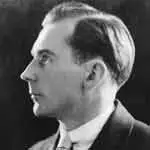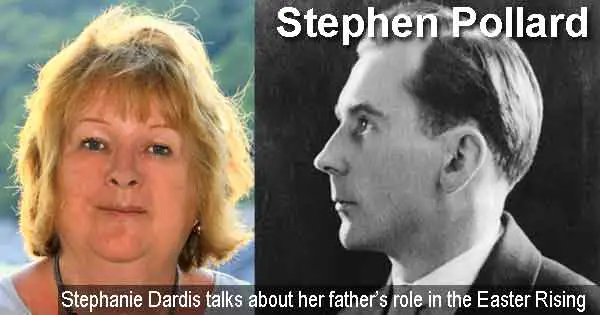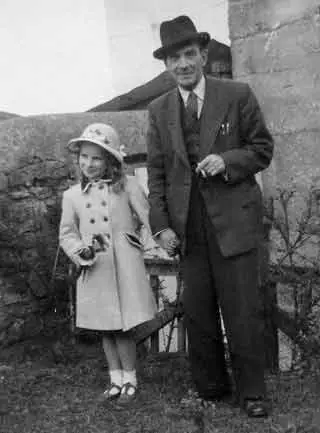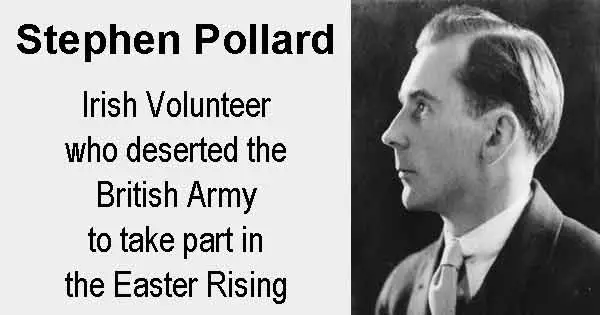
Stephen’s story is a fascinating one as he was a soldier in the British Army before deserting to take part in the fight for Irish freedom.
Stephanie is immensely proud of the part her father played in the Rising.
Here, in her own words, Stephanie talks about her father Stephen Pollard and describes how his involvement in the Rising has affected her own own life.
I am Stephanie (Pollard) Dardis, daughter of Stephen Pollard who fought at the Four Courts,
Easter Monday 1916.
I cherish many stories from my father’s life. So many events and his enormous courage to have gone through so much for his country. My father, was serving in the British Army and deserted the Army with his Lee Enfield rifle to join the Rebels, Easter 1916. He fought at the Four Courts alongside his brother, Frank Pollard, and his sister-in-law Louisa Pollard (nee O’Sullivan).
At the surrender, he was advised by his comrades to escape, as he would have been shot as a deserter. In the company of Joe McDonagh, he escaped up Dorset Street, hid in the Potato Market until morning and took refuge in a ‘friendly’ house.

When things calmed down he got a job in the munitions factory in Parkgate Street under the assumed name of ‘Tom Stephens’, where he remained until his arrest in November 1916.
He was arrested by a Major Price and was kept at Dublin Castle for 3 days.
He was subsequently court-martialled at Red March Camp, Sheffield. He was charged with participation in the Rising, as well as desertion from the British Army with a rifle. However, they had insufficient proof of his participation in the Rising and he was charged with desertion and theft of rifle only. He was sent to Derby Prison (December 1916), and detained there until his release in August 1917.
Stephen, in his submission to the Military Service Pensions Tribunal, pointed out that when released from Derby, it was under ‘open arrest’. From Derby Prison he was sent to Blackpool as a fully trained soldier of the British Army, preparatory to going on a draft of defaulters to France (fodder for the trenches in the Great War). He was not released as a free man, so he had to re-desert in order to get back to Dublin.
On his return he was appointed instructor to ‘E’ Company of the 1st Batt.
Stephen’s time was fully occupied, three/four nights per week and at weekends, giving intensive training to ‘E’ Company in bombing practise, musketry, lectures and rifle firing.
This took place in the Volunteers hall in Tara Street, sometimes in the open street, and on Sunday mornings they had rifle firing practices and revolver firing. The Volunteers had a training centre out in Finglas.
From this time he was severely on the run from the military and civilian Police until the amnesty at the end of 1918. He could not live at home, it was a night here on the northside and a night there on the south side.
At the beginning of 1919 he was still involved in the procurement of arms, sometimes from British army personnel selling them, and some from ex-military men who brought revolvers with them when leaving the service.
He was, in 1920, involved in a raid on the A. O.H. Hall, Parnell Square, and obtained 6/7 rifles and some equipment. It was an armed raid with Paddy Garland, Paddy Butler & some others. The arms were put in the Company dump in Lr. Dominic Street. This was followed by a raid on College Green Post Office where a Winchester rifled was obtained.

On another occasion he was sent to Strokestown, Co. Roscommon by the then Chief of Staff, Richard Mulcahy, where he was to instruct Seamus O’Roinn who was the O.C of the IRA in that area to convey information regarding the burning of all empty barracks in the country.
He was on armed patrol duty every Saturday night in the area where the officers of the Dublin Brigade met in Parnell Square. This was for approximately 12 months.
Stephen left the Volunteers in December 1920 as he had got a job in the UK, through a Welsh man. He stayed/worked in the UK until 1926.
Stephen never discussed the events at home
These events were never discussed in our house as I was growing up. Politics and religion were taboo! Neither of my parents were politically active when I was growing up.
However, my father’s involvement in the Rising definitely made me more interested in the events of 1916.
I was totally unaware of his level of involvement in the Rising until I read his account in the Military Service Pensions Collection. I knew imprecisely that he had been involved in 1916.

Every Easter Sunday morning as a child he took me to the Easter Parade in Dublin city. He used to wear a small yellow/gold ribbon on his suit jacket, but I had no idea of what it actually represented. Obviously the Easter Parade was extremely important to him.
It has raised so many questions in my mind. What motivated him to join the rebels? (He had joined them in November 1915, even though he was still in the Army).
Was it a social conscience, witnessing the poverty in Dublin at that time, the hardship, unemployment, the great divide between the rich and poor, a desire to live in a country governed by its own people?
Family are amazed and proud to read of Stephen’s participation in the Rising
I have told my children about their grandfather’s involvement in the Easter Rising. I have three sons, Conor Stephen, Eoin Terence and Kieron Martin. They have been amazed to read of his participation in the Rising and the consequences.
They are very proud and honoured to be his grandsons and look forward to telling his story to their own grandchildren one day!
Proud of what Stephen did for his country
When I look back on what my father achieved it makes me feel incredibly close to him and extremely proud of what he and his comrades, men, women and children, did for our country.
I have learned about him in a way I could never have known, and only discovered through the in-depth account contained in the Military Archives Pensions document, a document that is now very precious to me and for which I am very grateful that it has been made public and therefore accessible for the families involved.
I wish I could have talked to my Dad about his experiences. About his feelings, fears, hunger, cold, pain, loneliness, and all the emotions stirred by conflict.
I wish I could have told him how proud of him I am and how all this has made me love him even more, if that is possible.
Easter Rising was necessary
When I look back on the Easter Rising I feel it was necessary. It was an ideal/strategic opportunity while the British were at war in France. It planted the seeds of freedom and self-rule. It is sad that so many died, civilians and military. The execution of the Leaders was reprehensible, may they rest in peace.
However, they did not die in vain, as their deaths were the catalyst that changed the mind-set of so many who were opposed to the Rebellion and its cause, and generated support for the Rebels.
Hopefully centenary celebrations inspire a sense of national pride
I have been attending 1916 Relatives meetings ahead of the centenary commemorations.
Hopefully we will have a memorable, worthy, dignified and relevant celebration, especially one that will involve all generations throughout Ireland and far beyond. It will be an opportunity to emphasise the importance of the 1916 Easter Rising, the courage of those who participated, whatever their role, and how it changed the state of the nation.
Hopefully the centenary celebrations inspire a sense of national pride and an awareness of belonging to a great nation for us all and for future generations.
Did one of your relatives take part in the Easter Rising? If you would like to tell your story in our Easter Rising relatives section we would love to hear from you.
Please fill out the contact form below.
[contact-form-7 id=”36226″ title=”Easter Rising relatives”]
easter-rising-descendents.html
easter-rising.html